Shattered Glass
 for language, sexual references and brief drug use.
for language, sexual references and brief drug use.
Reviewed by: Jim O'Neill, M.D.
CONTRIBUTOR
| Moral Rating: | Offensive |
| Moviemaking Quality: |
|
| Primary Audience: | Adults |
| Genre: | Docudrama |
| Length: | 1 hr. 43 min. |
| Year of Release: | 2003 |
| USA Release: |
| Featuring |
|---|
| Peter Sarsgaard, Rosario Dawson, Chlo Sevigny, Jamie Elman, Hayden Christensen |
| Director |
|
Billy Ray |
| Producer |
| Gaye Hirsh, Adam J. Merims, Craig Baumgarten, Tove Christensen, Gaye Hirsch, Adam Merims |
| Distributor |
“He’d do anything to get a great story.”
In the late 1990s, The New Republic magazine ran a series of articles written by a young journalist named Stephen Glass. A film, “Shattered Glass,” written and directed by Billy Lane, tells Glass’ story of fast rise to fame and even faster fall from grace. Glass’ stories were outlandish and farcical, the kind of wild weekend tales the one kid in high school homeroom always had on hand to wake you up with on a Monday morning. That guy’s audience was always eager to be entertained, but not gullible enough to take the tales at face value.
Glass’ audience and his editors were both eager and gullible. These newsies turned none of that “healthy skepticism” they wear like armor in most situations when the tables turn in their direction. They gave all-around kudos to Glass’ stories about little boys who were computer hackers in their spare time, Texans who formed cults honoring George Bush, Sr. (the cultists also hated broccoli), conservative youth club members who victimize overweight girls, and other sundry miscreants who mingle in the messiest of misdeeds.
It took awhile for some people to guess that something was up, but the whistle blowers had to reach the pain threshold before the editors at The New Republic took their hands away from their ears. When the big guys finally confronted Glass with the apparent falsehoods, he made up some more whoppers, even better ones, to cover the original lies. He fabricated computer evidence, phone records, personal identities, and addresses which looked good; indeed, they were even better than the original fake stories, but all his backups had a way of crumbling on close inspection.
How many times have we heard that the coverup is worse than the crime? It ain’t so in Glass’ case. For him the crime is just a warm-up for the coverup. That’s when his juices really start to flow.
It’s unfortunate that Lane chose a bland actor such as Hayden Christensen (“Star Wars”) to play Glass. His goo goo eyed fawning has a wan appeal, like that of a bellhop who won’t let you carry your own bags, but he lacks a good liar’s finesse and flair. Christiansen’s portrayal falls fall short of Bing Crosby’s classic performance of a compulsive, and oh so forgivable, liar in “The Country Girl.”
After publishing almost 50 of these tall tales (The New Republic says that about half of them were actually true—yes, of course), the magazine fired Glass. He was in his twenties at the time. “Shattered Glass” has some sparkle and some elan in its early stages which sets it apart from the old cliched newsroom pictures. Unfortunately, as Glass starts his slide downward so does the film.
I winced the more Lane made The New Republic and the journalistic profession (go ahead, bow your heads) the put-upon victims of Glass’ Faustian onslaught. The attitudes of The New Republic publishers and readers who took the Glass manifestoes at face value are not even tweaked, let alone explored. The New Republic is a political magazine written by and read by urban elites. Glass was a talented writer, but he was an absolutely inspired con-man. Like a snake oil salesman, he had a knack for understanding his readers’ anxieties, attitudes and weaknesses. He gave polished Jerry Springer spectacles to the grammar conscious, vulgarity averse Upper West Siders and K-Streeters.
These sophisticated readers had no difficulty believing that young Christian conservative men would take time off from their conference to pick up an overweight girl, abuse her and abandon her. Intellectual elites believe this can be, and must be, true. Glass provided the tonic for that belief. No one ever questioned the ingredients because no one ever wanted to. As long as The New Republic and other papers such as The New York Times (perhaps the recent scandal involving liar Jason Blair and editor-enabler Harold Raines will hit the screens too) and filmmakers accept the premise that journalism remains stalwart in its professionalism in an age of moral relativism, the door will always remain open for a Glass or a Blair to slip through and set up a lair.
A good film would explore the too often dysfunctional relationship between writer and reader, and we would get a little closer to understanding why truth is so often evasive and is always on such shaky footing. So many writers printed lies in the Twentieth Century, and so many of those had their lies rewarded with spots on the best seller list (Alfred Kinsey’s—a film project based on his life is in the works—studies of prebubescent sexual stimulation and homosexuality; Margaret Mead’s “anthropological data” about the idyllic sexual promiscuity in the Far East), and Pulitzer Prizes (Walter Duranty’s bucolic tales of a peaceful, prosperous Soviet Union in the 1930s). These lies were full of promise. They depicted a kind of heaven on Earth for the gullible. What we got wasn’t heaven, but its opposite.
Two thousand plus years ago a man stood trial and told his judge that he came to Earth to bear witness to the truth. The weary governor who was to decide the man’s fate asked him “What is truth?” The governor was a cynic and did not anticipate or want an answer. It is just as easy to become cynical in today’s world as it was in that small province of Judea so many years ago.
Defining anything, especially truth, in the modern world is difficult and always subject to derision. An explanation becomes a function of what the meaning of “is” is. I was hoping that perhaps a filmmaker could shed some light on these dilemmas. The Stephen Glass imbroglio could have provided the perfect template, but “Shattered Glass” missed the mark, and the truth.
Violence: Minor | Profanity: Moderate | Sex/Nudity: None


Positive Elements: Deception, and one man’s struggle to conceal his lies, is a prevalant theme. When Stephen is forced to invent more lies to cover up the ones he’s already told, eventually leading to his downfall, one can easilly apply the Bible verse that states, “Be sure your sin will find you out.” This can lead to good discussions in a family atmosphere.
Negative Elements:
Sexual Content—In the opening sequence a store display of condoms is shown. A teen boy demands that he be paid a salary that includes a subscription to Playboy magazine. A journalist claims that there were “hookers” at a spring break bash.
Language—Not as rampant as in some movies, though there are at least two uses of the F-word, at least three uses of sh--, and several uses of “for Chr--’s sake.”
Violence—Nothing of consequence. Arduous yelling.
Drug and/or Alchohol content—Bottles of booze are seen littering a hotel room in which a spring break party is taking place.
Overall, an engaging and relatively clean movie, based on true events and embodying an underlying theme that can be applied universally. The DVD also features a 60 minutes interview with the real Stephen Glass.
[Average/4]
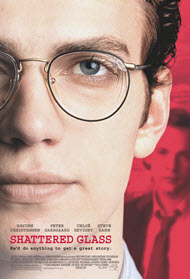


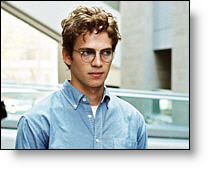
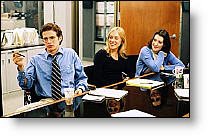
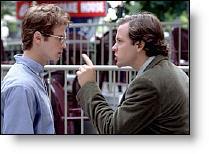
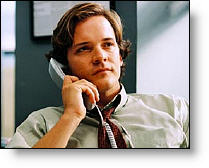

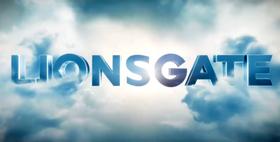
My Ratings: [Better than Average/3]